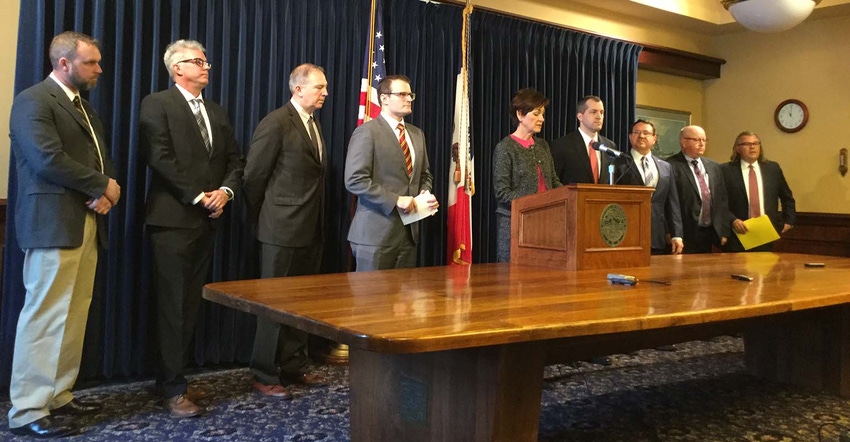April 12, 2018

Iowa Republican Gov. Kim Reynolds will be at the White House today to discuss trade issues with President Donald Trump. She will also meet with other governors and congressional leaders while in Washington. Reynolds will discuss “issues impacting the agricultural community, including trade.”
At her weekly news conference in Des Moines on April 11, Reynolds said she's closely monitoring communication between the two countries over proposed tariffs on a range of products. China's tariffs on U.S. exports could have a huge economic toll on soybeans, ethanol, pork and beef.
The governor talked Tuesday morning with U.S. Agriculture Secretary Sonny Perdue, and Office of Management and Budget Director Mick Mulvaney. Both assured her USDA has the authority to mitigate market disruptions caused by the tariff dispute. She said she also talked Monday with former Iowa Gov. Terry Branstad, who is now U.S. ambassador to China.
Trump is pondering a plan to help farmers
Reynolds said the Trump administration is working on plans to help U.S. farmers hurt by Chinese tariffs on U.S. ag commodities imported into China.
Asked if the Trump administration’s plan involves federal price supports for farm commodities, the governor said: “They are working through the details, so we are not at liberty to share those at this point. But the fact is, they are talking and working and the president has asked his cabinet members for ideas to do something to resolve the situation with China.”
While she was short on details about possible help for American farmers hurt by China’s tariffs, Reynolds pointed out the seriousness of a possible trade war. “The U.S. has benefitted from our long-standing relationship with China by establishing new and expanded opportunities for our ag commodities and equipment,” she said. “Ties between our farmers and China continue to grow. That’s why escalation of tariffs across the world is concerning, and the potential Chinese tariffs produce real issues.”
Trade sanctions could have devastating impact
The governor was joined at her press conference in Des Moines by Lt. Gov. Adam Gregg, Iowa Secretary of Agriculture Mike Naig, and a half dozen leaders in Iowa agriculture and the manufacturing community. They all agreed the tariffs could have a devastating impact on Iowa and U.S. agriculture, especially farmers and farm equipment manufacturers.
On March 23, the U.S. put a 25% tariff on imported steel and a 10% tariff on imported aluminum. In response, China placed retaliatory tariffs of 15% to 25% on 128 American products, including pork.
On April 3, the U.S. released a list of $50 billion worth of Chinese imports that would face a 25% tariff. On April 4, China said it would put an additional 25% tariff on more than 100 American goods, including soybeans, beef, corn and ethanol.
On April 5, President Donald Trump instructed the U.S. Trade Representative to consider $100 billion worth of additional tariffs. The last three proposed tariffs won’t go into effect for 60 days.
Farmers are often targets in trade disputes
“Farmers tend to be early targets in trade disagreements, and markets have reflected that uncertainty,” Gov. Reynolds said. “The potential damage to our export markets comes at a difficult time for our agriculture economy, with depressed commodity prices adding uncertainty for farmers as they head into the 2018 planting season.”
The governor added she agrees with the Trump administration that China has been a bad actor related to forced technology transfer, stealing trade secrets and intellectual property rights violations.
“No one wins in a trade war,” Reynolds said. “While some disruption may be necessary and part of the negotiation process, this can’t be done on the backs of our farmers. It’s important we find a reasonable agreement and make sure it’s targeted and done in a timely manner, which will help mitigate the risk of losing market share.”
The Trump administration says a public comment period on the proposed U.S. tariffs on imports of Chinese products runs until May 22, 2018. A public hearing will be held May 15, 2018.
Grassley says help may be on the way
U.S. Sen. Chuck Grassley, R-Iowa, said Tuesday the USDA’s Commodity Credit Corporation could play a role in helping farmers hurt by the Chinese tariffs on pork, soybeans, corn, beef and ethanol. The CCC helps farmers by providing loans, product purchases, payments and other actions to stabilize, support and protect farm income and prices.
“President Trump has asked U.S. Ag Secretary Perdue to come up with a plan and I’m going to wait and see what Secretary Perdue proposes,” said Grassley. Last week, Grassley called on the federal government to take responsibility for trade action that creates economic hardship for Americans. He noted that federal farm programs provide price protection that kicks in for corn, soybeans, wheat and other grain farmers, making up for “a catastrophic drop in prices.” However, other additional protection measures will be needed, he noted.
China blinked a little bit this week—announcing the planned opening of its economy. Grassley says this “is a step in the right direction. But there is much more that needs to be done.” He says his concern over President Trump’s imposing tariffs may inflict harm on U.S. agriculture and U.S. ag leaders need “to keep up the pressure to make sure the U.S. works with the Chinese and not against them.”
About the Author(s)
You May Also Like






